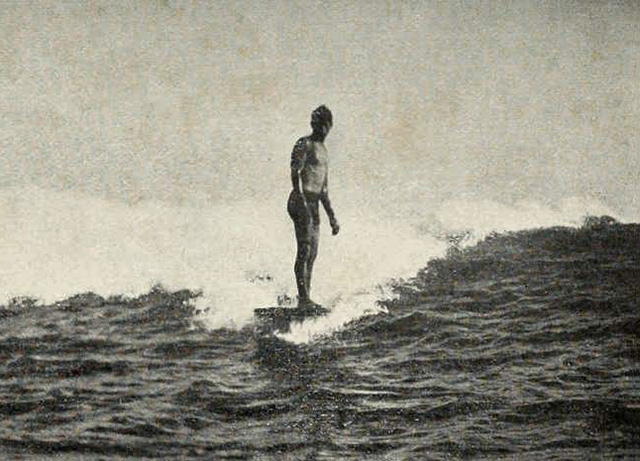Surfing has a rich and fascinating history that spans thousands of years. It's believed to have originated in ancient Polynesia, where it was deeply rooted in the culture and way of life. The people of Polynesia, particularly in Hawaii, were skilled watermen who relied on their ability to navigate the waves for fishing and transportation.
Surfing was much more than just a recreational activity for them—it held spiritual and social significance. Chiefs and warriors would showcase their prowess on the waves on boards carved from tree trunks, and surfing was seen as a way to connect with nature and the gods.
 a surfer in Hawaii in 1921 (from the book: Hawaii, past and present)
a surfer in Hawaii in 1921 (from the book: Hawaii, past and present) However, the arrival of European explorers and missionaries to Hawai and islands nearby in the 18th and 19th centuries brought significant changes to the practice of surfing. It was discouraged and even banned, as the new influences viewed it as a heathen activity.
For many years, surfing remained largely confined to Hawaii and the Pacific Islands, with only a few individuals outside these regions experiencing the thrill of riding waves. It wasn't until the early 20th century that surfing began to gain attention outside of its traditional roots.
In the early 1900s, Duke Kahanamoku, an Olympic swimmer from Hawaii, introduced surfing to the world during his travels and exhibitions. He showcased the art of riding waves in places like California and Australia, capturing the imagination of people everywhere.
The popularity of surfing slowly grew, and the 1950s and 1960s saw a significant boom in the sport. Surf culture emerged, fueled by movies, music, and an overall sense of adventure. Surfing became synonymous with the carefree, beach-loving lifestyle, with surfers becoming iconic figures of the era.
Advancements in surfboard design, such as the introduction of lightweight materials and the development of various board shapes, allowed surfers to push the boundaries of what was possible on a wave. This led to the rise of competitive surfing and the formation of professional surfing circuits.
Today, surfing is a global phenomenon, enjoyed by millions of people around the world. It has become a multi-billion-dollar industry, with professional surfers achieving celebrity status. Surfing is now even recognized as an Olympic sport, with surfing making its debut at the 2021 Tokyo Olympics.
Related Pages
- 5 Surfing Spots With the Most Student-Friendly Prices
- Surfing equipment
- More on the history of sport
- Surfing home


 Current Events
Current Events